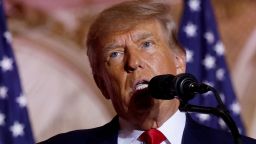Editor’s Note: Jeremi Suri holds the Mack Brown Distinguished Chair for Leadership in Global Affairs at the University of Texas at Austin, where he is a professor in the History Department and the LBJ School. He is the author and editor of eleven books, most recently, “Civil War By Other Means: America’s Long and Unfinished Fight for Democracy.” He is the co-host of the podcast, “This is Democracy.” The views expressed here is his own. Read more opinion on CNN.
The House January 6 committee’s decision to issue criminal referrals against former President Donald Trump marks a return to old expectations about the rule of law and its equal application to all citizens. The referrals are advisory and the Department of Justice will ultimately decide whether to indict Trump, but the January 6 committee’s message is loud and clear. They believe the former president should be prosecuted for serious crimes against the country.

The founders of our republic would approve. In creating the executive branch of the US government in Article 2 of the Constitution, the founders included a mandatory oath that affirmed the president must be deferential to the law, not vice versa. The president must “preserve, protect, and defend the Constitution of the United States” – the highest law of the land.
What the founders feared most was a president who would wield his power as an unchecked king to serve his personal interests and those of his friends. That is why the founders kept the office of the executive small, gave Congress the power of the purse and subjected the commander in chief to election every four years. They expected presidents to be humble and limited in their power. The criminal referrals against Trump return our country to those wise assumptions.
As the president performs his duties, it is often impractical to try him for potential legal violations because of the limits of judicial access to confidential information. The Constitution, however, presumes that the president, like all other citizens, will ultimately be accountable for any crimes, even if that requires waiting until he leaves office. Impeachment and removal from office are political responses to misconduct, but they do not preclude other forms of legal accountability.
Criminal responsibility is the deterrent against arbitrary and corrupt behavior. The absence of any discussion of post-presidential legal privileges and immunities in the Constitution is revealing: former presidents are ordinary citizens, subjected to ordinary laws.
Over more than two centuries, there have been a number of cases where either a president or vice president has been subjected to criminal prosecution. In 1804, Vice President Aaron Burr was indicted in two states – New York and New Jersey – for murdering Alexander Hamilton in their infamous duel. Burr was indicted again in 1807, after leaving office, for organizing an insurrection against the United States.
In 1973, Vice President Spiro Agnew pleaded guilty to a felony charge for tax evasion, after trying to claim that he and the president were immune from such prosecution. His immunity was denied by federal courts, and Agnew ultimately resigned.
Most relevant, President Richard Nixon could have faced criminal charges for his role in the Watergate break-in of Democratic Party headquarters and the subsequent conspiracy to cover it up. Confronted by the prospect of impeachment, Nixon resigned the presidency in August 1974, but the criminal investigations of his behavior continued. Nixon only escaped a potential indictment when his successor, President Gerald Ford, pardoned him weeks later. The pardon was necessary, according to Ford, to help the country move on because by the letter of the law “the serious allegations and accusations hang like a sword over our former president’s head.” Without a pardon, Ford expected Nixon would be indicted, and perhaps convicted. Ford wanted to avoid the political acrimony, especially for fellow Republicans, that would follow his predecessor’s legitimate prosecution.
Nixon largely retreated from the public eye, as did Agnew and Burr. Although justified, prosecution of these former executive officials did not seem necessary to prevent them from committing more crimes. Nixon’s pardon, in particular, remained controversial, but it did not threaten the security of American democracy.
The same cannot be said for Trump. The evidence is overwhelming that he used the office of the presidency to try to overturn the 2020 election. He laid the groundwork for the violent January 6, 2021, attack on Congress to prevent the certification of the new president. He also took classified documents and then refused to return them under subpoena. These allegations have been substantiated by the Justice Department and the January 6 committee investigation in Congress.
Whether Trump will be indicted or convicted is a matter for the US court system, but there is no doubt that his actions are potentially criminal and demand judicial attention, in no small part because of their grave consequences for our democracy.
Unlike Nixon, Trump has not retreated or changed his behavior since leaving office. He has called for the termination of the Constitution and all election laws to put him back into power. He has praised those who attended the January 6 rally preceding the attack on the US Capitol. And he has asserted the right to take government property and declassify confidential documents “just by saying it’s declassified, even by thinking about it.” It seems Trump’s penchant for flouting norms, rules and regulations has only grown since he left the White House for Mar-a-Lago.
The founders did not anticipate a man of Trump’s destructiveness, but they set up a system to hold leaders accountable. Prosecuting law-breaking by elected officials affirms that they are equal to other citizens, with the same duties and limitations. It sets an example and promotes law-abiding behavior.
Most importantly, prosecuting high-profile crimes prevents them from spreading and undermining democracy. The founders recognized that power could corrupt leaders and that punishment was the essential deterrent to abuse. Throughout its history, the United States has benefited from prevention of the most extreme corruption, allowing American institutions to develop in more law-abiding ways than in many other countries.
Although some might argue that prosecuting Trump could deepen partisan divisions, the greater risk is that he might escape punishment. Democracy cannot survive with lawlessness, especially from elected leaders.
The most essential check on power built into American governance is the rule of law, administered by an independent criminal justice system. That system is far from perfect, but it continues to interrogate evidence of wrong-doing and punish those found guilty. Trump must be subjected to this process if the United States is to maintain its fundamental checks on corrupt power.
If the DOJ decides to indict Trump, it will likely shrink the executive branch back to its smaller and more accountable roots in our nation’s founding. It will affirm a long history of rule of law, and it will prevent a repeat of the most destructive presidential actions in recent years.
The presidency will likely become more modest and focused on the lawful needs of our democracy, and less subject to the arbitrariness and self-serving behavior the founders feared. The House January 6 committee’s decision to issue criminal referrals against Trump fits old expectations for our democracy, and an indictment from the DOJ would set a valuable precedent for the nation’s third century.



